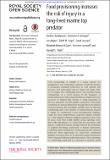Food provisioning increases the risk of injury in a long-lived marine top predator
Abstract
Food provisioning of wildlife is a major concern for management and conservation agencies worldwide because it encourages unnatural behaviours in wild animals and increases each individual's risk for injury and death. Here we investigate the contributing factors and potential fitness consequences of a recent increase in the frequency of human interactions with common bottlenose dolphins (Tursiops truncatus) in Sarasota Bay, Florida. A rising proportion of the local long-term resident dolphin community is becoming conditioned to human interactions through direct and indirect food provisioning. We investigate variables that are affecting conditioning and if the presence of human-induced injuries is higher for conditioned versus unconditioned dolphins. Using the most comprehensive long-term dataset available for a free-ranging bottlenose dolphin population (more than 45 years; more than 32000 dolphin group sightings; more than 1100 individuals), we found that the association with already conditioned animals strongly affected the probability of dolphins becoming conditioned to human interactions, confirming earlier findings that conditioning is partly a learned behaviour. More importantly, we found that conditioned dolphins were more likely to be injured by human interactions when compared with unconditioned animals. This is alarming, as conditioning could lead to a decrease in survival, which could have population-level consequences. We did not find a significant relationship between human exposure or natural prey availability and the probability of dolphins becoming conditioned. This could be due to low sample size or insufficient spatio-temporal resolution in the available data. Our findings show that wildlife provisioning may lead to a decrease in survival, which could ultimately affect population dynamics.
Citation
Christiansen , F , McHugh , K A , Bejder , L , Siegal , E M , Lusseau , D , McCabe , E B , Lovewell , G & Wells , R S 2016 , ' Food provisioning increases the risk of injury in a long-lived marine top predator ' , Royal Society Open Science , vol. 3 , no. 12 , 160560 . https://doi.org/10.1098/rsos.160560
Publication
Royal Society Open Science
Status
Peer reviewed
ISSN
2054-5703Type
Journal article
Description
This publication was supported by the US Department of Commerce’s National Oceanic and Atmospheric Administration under NOAA Award NA14OAR4170098, the Mississippi-Alabama Sea Grant Consortium (Project R/MG/BR-15B). Long-term data were collected with additional major support from the Batchelor Foundation, Disney’s Worldwide Conservation Fund, Dolphin Quest, Earthwatch Institute and the Chicago Zoological Society.Collections
Items in the St Andrews Research Repository are protected by copyright, with all rights reserved, unless otherwise indicated.

